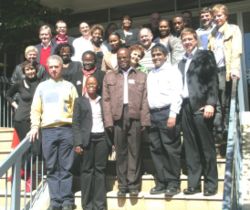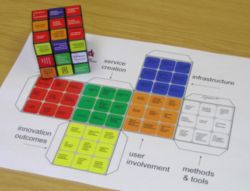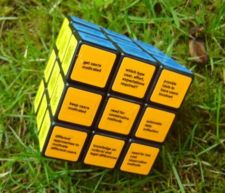Supporting Living Labs in South Africa: Difference between revisions
| Line 13: | Line 13: | ||
The lack of a proper understanding what triggers innovations and which innovations prove to be successful in different environmental, social and cultural contexts poses a big threat to the design of real-world innovation. This is in particular true for South Africa. Being a ‘society in transition’ | The lack of a proper understanding what triggers innovations and which innovations prove to be successful in different environmental, social and cultural contexts poses a big threat to the design of real-world innovation. This is in particular true for South Africa. Being a ‘society in transition’ | ||
facing the challenge of social change and social innovation South Africa needs to understand how to | facing the challenge of social change and social innovation South Africa needs to understand how to do advanced African innovation research. Designing real-world innovation in an African way might therefore differ from the indigenous tradition and might not be similar to the western world as well; however, what’s similar is that its start is community-driven. | ||
| Line 21: | Line 21: | ||
Application innovation, through innovation in ICT contribute to and facilitate the research, development and implementation of ICT application that address ‘Digital Divide’ related problems in South Africa and other developing countries. The institute will focus on the pre-competitive space and areas of market neglect with strong emphasis on co-operation with end-users and industry players. A number of application domains have been identified with stakeholders and implementation of R&D and innovation programmes are being prioritized in consultation with stakeholders" | Application innovation, through innovation in ICT contribute to and facilitate the research, development and implementation of ICT application that address ‘Digital Divide’ related problems in South Africa and other developing countries. The institute will focus on the pre-competitive space and areas of market neglect with strong emphasis on co-operation with end-users and industry players. A number of application domains have been identified with stakeholders and implementation of R&D and innovation programmes are being prioritized in consultation with stakeholders" | ||
=='''The Focus'''== | =='''The Focus'''== | ||
Revision as of 15:32, 17 June 2008
|

Overview
The lack of a proper understanding what triggers innovations and which innovations prove to be successful in different environmental, social and cultural contexts poses a big threat to the design of real-world innovation. This is in particular true for South Africa. Being a ‘society in transition’ facing the challenge of social change and social innovation South Africa needs to understand how to do advanced African innovation research. Designing real-world innovation in an African way might therefore differ from the indigenous tradition and might not be similar to the western world as well; however, what’s similar is that its start is community-driven.
"Innovation in ICT leading to applications that address development challenges facing South Africa, the Continent and the developing world thereby directly contributing to addressing the challenges faced by the second economy.
Application innovation, through innovation in ICT contribute to and facilitate the research, development and implementation of ICT application that address ‘Digital Divide’ related problems in South Africa and other developing countries. The institute will focus on the pre-competitive space and areas of market neglect with strong emphasis on co-operation with end-users and industry players. A number of application domains have been identified with stakeholders and implementation of R&D and innovation programmes are being prioritized in consultation with stakeholders"
The Focus
Specialists in this group have a joint vision of South Africa as a “competitive and progressive 21st century nation". Through user-driven, open innovation initiatives; bring forth a new mindset of the South African society as equal custodians of the building blocks to all-forms-of- access-&-inclusion.
We are participating in the global economy and want to be recognized internationally for the contribution we will make as co-creators of the Global Knowledge Society.
Living Lab Initiatives in South Africa
- Sekhukhune Living Lab
- Rural Enterprise creation
- Limpopo Living Lab
- Dwesa Living Lab
- Partnership in the Eastern Cape between Universities of Rhodes & Fort Hare, Nokia Siemens Networks, Meraka Institute and COFISA
- Rural connectivity and ICT applications
- Feasibility study-phase in June 2008
- Ndlovu Living Lab
- Partnership between the Ndlovu Medical Centre, Elandsdoorn Development Trust, INTEL and Meraka
- Telemedicine and rural connectivity
- Soshanguve Living Lab
- Planned by Tshwane University of Technology (ICT Faculty)
- Education, Research, Community Development, Job Creation
- Bushbuck Ridge
- SAP Research and Wits University
- Patient Health System for chronically ill patients in rural areas
International Linkages
ENOLL
COFISA
Methods and Tools
The Harmonization Cube
 |
 |
The six sides of the cube correspond with the following topics:
- User Involvement (Orange)
- Service Creation (Green)
- Infrastructure (Blue)
- Governance (Red)
- Innovation Outcomes (Yellow)
- Methods & Tools (White)
A do-it-yourself foldable paper version of the Harmonization Cube
Events
2008-06-00 Supporting the Living Labs in South Africa 2008-2010 Strategy Workshop
2008-06-11 COFISA Workshop - Living Lab development
2008-05-17 to 24 COFISA-Finland Living Labs Collaboration Visit
2008-05-12 to 16 Collaboration @ Rural 4th Plenary meeting
2008-05-07 to 09 IST Africa, Windhoek, Namibia
2008-04-24 Workshop at Meraka Institute
Publications
(Section Under construction)
Living Labs discussion forum
A Google discussion group called Supporting Living Labs in South Africa has been created as a discussion and interaction platform. Any Living Lab practitioner is welcome to join.
Name for the Initiative
The current name is a working title. We are looking for a name for the initiative. Suggestions are listed below. Please provide contributions.
- Supporting Living Labs in Southern Africa (SLLiSA)
- Living Labs of Southern Africa (LLOSA or LLoSA)
- Living Labs in Southern Africa (LLISA or LLiSA)
Contact Details
| Contact Person: | Shela Boshomane |
|---|---|
| Tel: | +27(0)12 841 4432 |
| Fax: | +27(0)12 841 4720 |
| Email: | sboshomane[at]csir.co.za |
| Contact Person: | Mario Marais |
|---|---|
| Tel: | +27(0)12 841 3771 |
| Fax: | +27(0)12 841 4720 |
| Email: | mmarais[at]csir.co.za |





